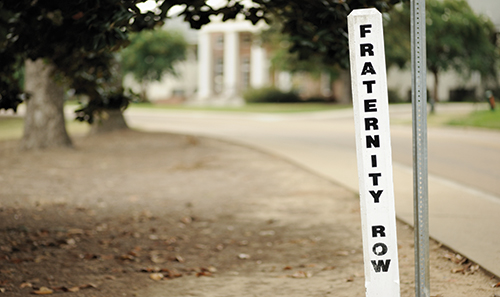Greek life must undergo significant introspective reform
Question of fraternities’ and sororities’ involvement in class division starts at the individual level

April 29, 2021
While it may now appear as though we are overcome by seemingly inescapable ideology, the recognition of these ideologies in practice is crucial in identifying the role we play in it and determining if we perhaps can ever escape it.
Returning to Greek life as an example, fraternities and sororities can be considered “mass ornaments” with routinized traditions, created mostly by rich dead white people that often result in the production of spectacles and can be viewed as a distraction factory. Viewing Greek life as a capitalist ornament explains the spectacular nature that leads to the male gaze and also why they train consumerist attitudes. As such, how can we work to undo these ideologies?
Given that the various relationships that have been analyzed can be understood collectively through the idea of the mass ornament, it seems reasonable to turn to Siegfried Kracauer for a way out of this dilemma. Kracauer suggests that overcoming ideology “can move forward only when thinking circumscribes nature and produces man as he is constituted by reason. Then society will change. Then, too, the masses’ ornament will fade away and human life itself will adopt the traits of that ornament into which it develops, through its confrontation with truth, in fairy tales.” In other words, Kracauer thinks we need to rationally understand our historical myths — only in that way can we produce a set of social relationships that are based on reason rather than uncritically adopting past customs.
Through analyzing the history and manifestation of the Greek system we can understand that its rituals express a desire for socializing and peer networks. Thus, there needs to be a significant reform to the Greek system. Or, at the very least, an inquiry on its practices and their motivations. Once we begin to dig deeper it will become clear that the social practices of fraternities and sororities are nothing more than a product of American distraction factories, just as Kracauer suggests. We can begin by challenging the structures that support Greek life itself, whether that be capitalist-driven institutions like Wake Forest that provide a space for Greek life to thrive or the structure of fraternities and sororities themselves. If we pick apart fraternities and sororities, we unveil the hierarchical system in place that reinforces class division and supports the mass ornament.
How, though, do we take apart Greek life so as to uncover and repair the implications of ideology? I would say that the first step is quite simple: it is beginning a process of questioning.
This questioning can begin at the individual level: how deeply do you think into your decisions? I don’t just mean the thought process of “I am going to do X thing for Y outcome.” Have you ever thought to question “well, why X specifically? Why not A, or M?” and “why do I want Y? What is Y’s intrinsic value that makes it such that I will convince myself I should specifically do X to ensure Y?” The second we start asking these questions in one facet of our lives, it becomes natural to inquire more broadly about the way ideology can partake in our lives. We can even fill in the variables to question Greek life: why does Greek life exist? Why participate in Greek life and not other academic organizations? Why do I want to be in Greek life? What is valuable about Greek life that makes me want to be a participant in it?
This process of questioning allows us to seemingly pick apart the structure and see it for what it really is. Once we do this, we can see how well the structure meets up with our own individual values and needs. The mass ornament forms above the people, and therefore the masses are incapable of truly seeing its totality since they are each consumed with their partial function within the organizational whole. The same can be said for Greek life — members are most concerned with how they fit into the social scene that they are unable to see what the structure itself stands for.





















